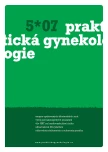Analysis of Perinatology Results in Olomouc Region in Recent Ten Years (1997-2006)
Authors:
M. Větr
Authors‘ workplace:
Gynekologicko-porodnická klinika LF UP a FN Olomouc
Published in:
Prakt Gyn 2007; 11(5): 207-211
Overview
Objective:
The objective is to assess the trends in the principal perinatology data over the last decade and their comparison with the average for the Czech Republic. The analysis forms part of the system of medical care quality monitoring.
Data and method:
Results from perinatal databases of the Committee for Perinatal Medicine of the Czech Republic (10 million inhabitants) and from perinatal data records of all hospitals in the Olomouc region (600 000 population) were used for the analysis in this cohort study.
Outcome:
Beginning with the 1990’s, a significant improvement of perinatal morbidity rate was recorded, and the results became very good after 2000, when perinatal death rate fell below 4 per mille. However, an increase in the rate of preterm deliveries of low birth weight infants (LBW – less than 2,5 kilogram) from 5,7 % to 7,2 % was recorded from over the last ten years. Comparison of results of main perinatology indicators confirms that in the recent decade the rate of perinatal mortality only exceeded the national average three times. The perinatal death rate without congenital malformations and stillbirth rate only exceeded the national average in two years. A worse statistically significant result of CNU excluding congenital malformations was recorded in 2001, and was exclusively related with the extremely low weight category of 500–749 kg. In that year, an unusual swing in the number of children with this extremely low birth weight was recorded. Failure of newborn care resulted in the death of 11 out of 16 born children. None of these children had an inborn defect. In the same year, there was recorded the highest incidence of inborn defects in stillbirths for the whole decade (5 cases per 15 stillbirths). Altogether congenital malformations occurred in 8 out of 32 perinatal deaths. The stillbirth rate without congenital malformation only exceeded the national average once, in 1998. Perinatology results in the region of Olomouc for the in last five years have been affected by an increase in the number of premature labours exceeding the capacity of the neonatal intensive care unit in Olomouc. Transfers of parturients with imminent premature labour to other perinatology centres make up for one fourth of all cases.
Conclusion:
The analysis of the main perinatology data for the recent years confirms that the indicators monitored in region of Olomouc were, in the majority of cases, better than the national average. A major problem for the region over the last five years has been the increased incidence of premature labours and the related shortage in the neonatal intensive care unit capacity.
Key words:
perinatal mortality – premature labour – quality of care
Sources
1. Plavka R. Analýza výsledků neonatologické péče za rok 2004. XXII. konference Sekce perinatální medicíny, ČGPS ČLS JEP, 13.-15. duben 2005, Sněžné-Mílovy.
2. Plavka R. Analýza výsledků neonatologické péče za rok 2006. XXIV. konference Sekce perinatální medicíny, ČGPS ČLS JEP, 19.-20. duben 2007, Pardubice.
3. Štembera Z, Velebil P. Perinatologie v České republice na konci tisíciletí – celostátní perinatální úmrtnost. Čes Gynek 2001; 66 : 16-20.
4. Štembera Z, Velebil P. Analýza výsledků porodnické péče za rok 2006. XXIV. konference Sekce perinatální medicíny, ČGPS ČLS JEP, 19.-20. duben 2007 Pardubice.
5. www.demografie.info/cz
6. www.czso.cz
Labels
Paediatric gynaecology Gynaecology and obstetrics Reproduction medicineArticle was published in
Practical Gynecology

2007 Issue 5
-
All articles in this issue
- Differential diagnosis and therapy of recurrent pregnancy loss – part 2
- Analysis of Perinatology Results in Olomouc Region in Recent Ten Years (1997-2006)
- The significance of ultrasound 3D examination in diagnosing foetal birth defects
- Microwawe radiometry and the breast disease - introducing the new diagnostic method into practice?
- Detection of Chlamydia trachomatis antigens by the Clearview Chlamydia test
- Current view of the effect of hormone replacement therapy on cardiovascular risks – 2007 update
- Practical Gynecology
- Journal archive
- Current issue
- About the journal
Most read in this issue
- The significance of ultrasound 3D examination in diagnosing foetal birth defects
- Differential diagnosis and therapy of recurrent pregnancy loss – part 2
- Detection of Chlamydia trachomatis antigens by the Clearview Chlamydia test
- Microwawe radiometry and the breast disease - introducing the new diagnostic method into practice?
